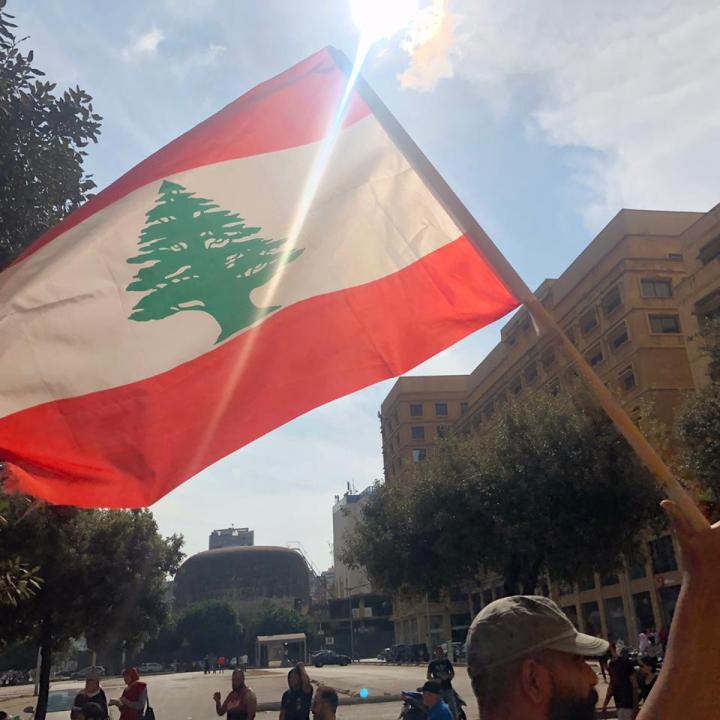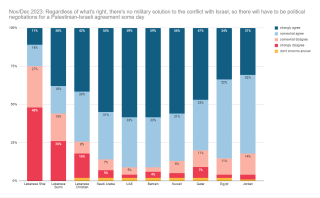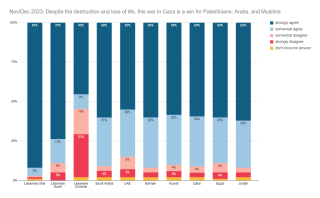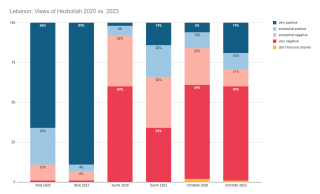
- Policy Analysis
- Fikra Forum
In the Shadow of Hezbollah-Israel Escalation, Poll Shows Slim Majority of Lebanese Still Want Focus on Domestic Reforms over “Foreign Wars”

The question of Hezbollah’s role in the conflict—or relative lack thereof—is a matter of interpretation within Lebanon. In contrast, support for Hamas is more widespread across Lebanese society, although very positive views are especially concentrated in the Shia community.
With the question growing of whether escalations between Israel and Hezbollah will erupt into a full scale conflict, TWI polling examined Lebanese attitudes towards the Israel-Hamas war and Hezbollah’s role in polling fielded from November 14-December 6. When presented with the statement “Right now, internal political and economic reform is more important for our country than any foreign policy issue, so we should stay out of foreign war,” Lebanese are divided on this question—but a slim majority continue to agree.
Breaking down this data by sect demonstrates significant differences in attitudes towards this issue. Whereas the majority of Sunni and Christian respondents agreed (66% and 74% respectively) with this proposal, about a quarter of Shia said the same (27%). Nevertheless, only 39% of Shia disagree “strongly” with such a proposal.
However, perceptions of a military rather than political solution to the conflict between Israelis and Palestinians is much more pervasive than in other Arab countries polled. In contrast to the majority perception in other Arab countries, Lebanese are split as to whether there will have to be eventual “political negotiations for a Palestinian-Israeli agreement” as opposed to a “military solution.” 53% of Lebanese agreed with this proposal overall, with drastically different attitudes depending on sect. Only 25% of Shia agree with such a statement, as compared to 56% of Sunni and 75% of Christians.
On the other hand, there is a near unanimous consensus (99%) that Arab countries should “immediately break all contacts with Israel in protest against its military action in Gaza”—in line with similar attitudes in other countries polled. Moreover, most agree that Israel is “so weak and divided that it can be defeated someday”—only among Christian and Druze Lebanese (about 15%) is there even minority perception that this is not the case. Yet there are also substantial differences among Lebanese populations, unlike most other Arab populations polled. Lebanese Christians are also split as to whether the current war should be considered a “win” for Palestinians, Arabs, and Muslims “despite the destruction and loss of life”—54% agree, in contrast to strong majorities elsewhere.
Parsing Lebanese attitudes towards Hamas, Hezbollah, and Iran
The popularity of Hezbollah remains sharply divided across sectarian lines. Whereas 34% of Sunnis and 29% of Christians express even a somewhat positive view of Hezbollah, 93% of Shia do so—with 89% saying they have a “very positive” opinion. While these results may be complicated by respondent concerns about polling on sensitive questions, it is worth noting the bump in approval across the board from when last polled in November 2020.
The question of Hezbollah’s role in the conflict—or relative lack thereof—is also a matter of interpretation within Lebanon. Lebanese attitudes towards the following statement: “Events of the past few weeks show that Iran, Hezbollah, the Houthis, and their other militia allies are, and for various reasons, reluctant to help the Palestinians” are split half and half. Whereas 17% of Shia agreed, 63% of Sunni and 69% of Christian stated they agreed strongly or somewhat. This results are similar to attitudes from late 2021, when 57% of Sunni and 64% of Christians agreed to a related proposition: “Wherever Iran intervenes, it hurts the local Arabs and doesn’t help the Palestinians.”
In contrast, support for Hamas is more widespread across Lebanese society, although very positive views are especially concentrated in the Shia community. In total, 79% of Lebanese express a positive opinion of Hamas. Only in the Christian community are views more equivocal, split between 59% positive and 38% negative. Support for the Muslim Brotherhood is likewise relatively high in contrast to other countries polled. Even among Lebanese Christians, 21% express a positive view, whereas 45% of Shia and 53% of Sunni Lebanese say the same.
Souring Views of U.S. Role in Region
Whereas the majority of Gulf Arabs believe that the United States could still have the most important role to play in the conflict, fewer Lebanese are convinced—when asked to respond to “The U.S. is still in the best position to help end the war in Gaza, even if I disagree with its policies,” most Lebanese disagreed (71%).
Moreover, there has been a notable shift across Lebanese society away from the United States and towards other powers that have sought to align themselves with the Global South. Over two years, the proportion of those who agree with the statement that “our country cannot count on the U.S. these days, so we should look more to Russia or China as partners” has increased by seventeen points, with half now saying that they “strongly agree” with such a statement (versus a third two years prior). The increase in this perception is across the board, including among Christians who by and large disagreed in years past.
Methodological Note
This survey employs a multi-stage probability household sampling, and is based on a nationally representative sample of 1000 Lebanese citizens, including 293 Sunni, 271 Shia, 366 Christian, and 70 Druze Lebanese. The margin of error for total Lebanese sample is 3% and is 6% for Sunni and Shia/5% for Christian subsamples. While proportionally representative, separate analysis of Druze attitudes is not included in breakdown by sect due to the small number of Druze respondents in this sample. These samples are included when statistics for “total Lebanese” are provided.
Due to Lebanon’s lack of official census data since 1932, population statistics are sourced from a number of recent population surveys. Further methodological details are available on request; please reach out to submissions@fikraforum.org for more information.





